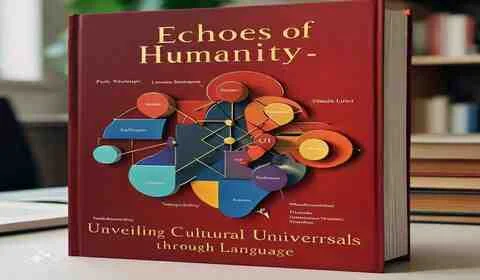Echoes of Humanity: Unveiling Cultural Universals through Language
Introduction
Language is a powerful tool that transcends borders, cultures, and generations. It serves as a vessel for communication, a repository of collective wisdom, and a bridge between diverse communities. Yet, beneath the vast array of languages spoken across the globe lie striking commonalities that reveal the shared essence of human experience. This essay explores these cultural universals through the lens of language, shedding light on the profound ways in which our linguistic practices reflect the core of our humanity.
The Universality of Language
Language is a universal characteristic of the human species. Every known society has developed its own language, a complex system of symbols and rules that allows its members to communicate. Despite the diversity of languages, certain structural elements, known as linguistic universals, are common across all languages. These include phonemes (basic sound units), syntax (sentence structure), and semantics (meaning). The study of these universals provides insight into the cognitive processes underlying human language and offers a glimpse into the shared nature of human thought.
Historical Evolution of Linguistic Universals
The concept of linguistic universals has intrigued scholars for centuries. From the philosophical inquiries of the ancient Greeks to the scientific analyses of modern linguists, the quest to uncover the common threads of language has been a central theme. Pioneers such as Noam Chomsky have argued for an innate linguistic capability, suggesting that the ability to acquire language is hardwired into the human brain. This perspective is supported by the presence of universal grammar—a set of grammatical principles shared by all languages.
The Role of Language in Shaping Culture
Language is not merely a tool for communication; it is a cornerstone of culture. It shapes how people perceive and interact with the world, influencing their values, beliefs, and social norms. Through language, cultural knowledge is transmitted from one generation to the next, ensuring the continuity of cultural practices. The relationship between language and culture is bidirectional: while language shapes cultural identity, cultural contexts also mold language.
Language as a Reflection of Human Cognition
Language is a window into the human mind. The ways in which different languages encode experiences and concepts reveal much about cognitive processes. For instance, the presence of specific words for certain emotions or concepts in one language but not in another highlights the cognitive priorities of different cultures. Research in linguistic relativity suggests that language influences thought, shaping how individuals perceive reality and categorize their experiences.
Shared Themes in World Languages
Despite the diversity of languages, there are common themes that emerge across different linguistic traditions. These themes reflect fundamental aspects of human life and social organization.
Kinship TermsKinship terms are universal, as family structures are central to all human societies. Words for mother, father, sibling, and other relatives are found in every language, though the specific terms and their connotations vary widelyBasic Color TermsThe categorization of colors is another universal aspect of language. Research by Brent Berlin and Paul Kay demonstrated that there are common patterns in how languages classify colors, suggesting a universal cognitive basis for color perception.Pronouns and PolitenessThe use of pronouns and forms of address is a universal linguistic feature that reflects social hierarchies and cultural norms of politeness. Languages encode respect, familiarity, and social status through pronoun usage, highlighting the interplay between language and social structures.Concepts of Time and SpaceAll languages have ways to describe time and space, though the specific expressions and metaphors used can vary significantly. These linguistic elements reveal how different cultures conceptualize temporal and spatial relationships.
Language and the Expression of Emotions
Emotions are a universal aspect of human experience, and all languages have mechanisms for expressing them. However, the specific vocabulary and cultural scripts for emotions can differ. For example, the Japanese concept of "amae" (a sense of nurturing dependence) has no direct equivalent in English, reflecting unique cultural values around interpersonal relationships.
Myth, Folklore, and Storytelling
Storytelling is a universal human activity, with every culture possessing its own myths, legends, and folktales. These narratives serve to explain natural phenomena, impart moral lessons, and preserve historical events. The themes of these stories often reveal common human concerns, such as the struggle between good and evil, the hero's journey, and the quest for identity.
Language and Rituals
Rituals are a key component of cultural life, and language plays a crucial role in their performance and transmission. From religious ceremonies to social rites of passage, the language used in rituals reinforces cultural values and communal bonds. Ritual language often includes specific phrases, chants, and songs that hold symbolic significance.
The Impact of Language on Social Structure
Language influences social structure by defining roles, norms, and relationships within a community. Sociolinguistics explores how language varies according to factors such as gender, age, socioeconomic status, and ethnicity. This variation reflects and reinforces social hierarchies, highlighting the role of language in maintaining social order.
The Future of Linguistic Studies
As the world becomes increasingly interconnected, the study of linguistic universals continues to evolve. Advances in technology, such as computational linguistics and machine learning, offer new tools for analyzing linguistic data and uncovering deeper insights into the nature of language. Additionally, the documentation and preservation of endangered languages remain crucial for understanding the full spectrum of human linguistic diversity.
Conclusion
Language is a mirror of humanity, reflecting the shared experiences and universal themes that unite us. By examining linguistic universals, we gain a deeper appreciation of the commonalities that underlie our diverse cultural expressions. In a world marked by rapid change and globalization, understanding these echoes of humanity through language fosters a greater sense of connection and mutual respect among people from different backgrounds. Through continued exploration and preservation of linguistic diversity, we can uncover the profound ways in which language shapes our understanding of ourselves and each other.


No comments:
Post a Comment